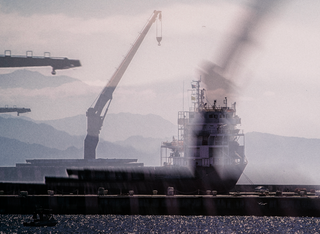News
Why we Should Worry about the Lady R — and the United States
The US government has apparently chosen to drop the matter and paper over the dispute, seemingly because there are wider strategic, inter-governmental interests at stake.

Director, The Brenthurst Foundation

Research Director, The Brenthurst Foundation


It had all the hallmarks of a grand cover-up. The commission met behind closed doors, was guided by terms of reference set by the government it was investigating – which were never made public – and did not publish its report for reasons that are unconvincing.
South Africans were essentially asked to take the government’s word that no arms, munitions, propellants and technology of military use were shipped to Russia on the Lady R.
But there remain troubling questions which, however uncomfortable for a government intent on resetting its narrative following a year of disastrous flirtation with Russia, must be asked.
This is not least because such cover-up “inquiries” are becoming a common feature of the government’s reaction to criticism.
Witness the Reserve Bank’s recent acrobat spin over the Phala Phala scandal. It found that it was okay for someone to hand over hundreds of thousands of US dollars in cash to the President because the transaction had not been “perfected”.
This inquiry was also held behind closed doors and its report was never published. The South African people were deemed only worthy of a short “summary” which cleared the President of wrongdoing.
Lady R problems
Looking at the Lady R inquiry now that the dust has settled, it is plain to see that it lacked all the elements of an interrogative investigation.
Here are the key problems:
It was conducted behind closed doors. Were the right witnesses called? Were they asked the right questions? The panel’s key claim is that no witnesses came forward to produce evidence of the arms shipment. This is misleading as it is very likely that such evidence was obtained through intelligence channels and no government would compromise these by getting them to testify before an inquiry.
The US ambassador, who made the claim about the arms shipment, did not come forward with evidence, disobeying the old “put up or shut up” rule of diplomacy – but that doesn’t automatically exonerate the government.
Its terms of reference were never made public. What was the panel asked to look into? It said no arms had been exported to Russia. How was “arms” defined? What about propellants or computer chips used in arms?
The full report has not been published. Why would it not be made public if there was nothing to hide? We are told that state security is paramount. Aside from the fact that this use of “state security” to hide information is unpalatable in a democracy, this excuse raises new, alarming questions. What sort of weapons were we buying from Russia that the public cannot be trusted to know about? This brings us to the next problem – why the cargo was moved at night.
The summary refers to the goods being loaded at night due to secrecy considerations.
“As part of the standard practice in relation to this kind of equipment (specifically in relation to its intended use),” it reads, “the goods were offloaded at night, under cover of darkness.”
As one naval expert with 40 years of experience in military and civilian cargo operations put it, “I do not know of any goods that must be loaded or offloaded under cover of darkness, from a safety perspective. However, if secrecy is paramount, this changes the game. A pallet of gold or a pallet of anti-personnel mines would definitely raise some eyebrows and international interest,” the expert observes.
Misleading findings
The panel’s findings on the vessel’s use of its transponder were misleading.
“The Panel was informed that, as a result of the urgent circumstances in which the docking at [Simon’s Town] was procured, and the tracking of the vessel by foreign intelligence agencies, the vessel switched off its Automatic Identification System (AIS) transponder.”
But Lady R rarely uses its AIS. Only in the Black Sea does it use it 100% of the time to avoid being sunk by its own forces.
Tellingly, the US Ambassador, Reuben Brigety, has not withdrawn his assertion that weapons were loaded.
In a May press conference, Brigety claimed that Washington was “confident” the Lady R had uploaded weapons and ammunition from South Africa the previous December.
Calling it “fundamentally unacceptable”, Brigety said he “would bet my life on the accuracy of that assertion”.
The US government has apparently chosen to drop the matter and paper over the dispute, seemingly because there are wider strategic, inter-governmental interests at stake.
Perhaps it was spooked by South Africa’s entry into the orbit of China at the recent BRICS summit and wants to retain whatever waning influence it has.

The US government’s role is, of course, not to protect South Africans from its government, or Ukrainians and Afghans for that matter. It is to protect the interests of the United States of America.
There is much to fear in this regard. Washington has a troubled history of looking after the interests of citizens of other nations, even its closest allies. Just ask South Vietnam or the Afghans.
In other words, don’t expect the United States to help if and when your country falls apart, even if they promise you a helicopter ride from the Embassy. It’s not their responsibility nor, frankly, their form.
Curious difference
And this leads to the curious difference between the panel’s findings and the South African President’s speech on 3 September, and the qualifications made.
The report noted: “Despite some rumours that some equipment or arms were loaded on the Lady R, the Panel found no evidence to substantiate those claims. Available evidence only confirmed the offloading and that there was nothing loaded.” Available evidence seems key here.
“The panel found that there was no evidence to support the claim that the ship transported weapons from South Africa destined for Russia,” Ramaphosa emphasised.
Weapons from South Africa would presumably exclude weapons or componentry from elsewhere, loaded in Simon’s Town, wouldn’t it?
The release of the full report and the terms of reference would help to clarify this. Or Washington could come clean about what it knows. Until either side does so, the cost of this murky mess will be borne by the South African public.
In the meantime, the South African public should not accept these redacted summaries of inquiries held under cover of darkness with opaque terms of reference as the final word on these matters.
To do so would be to accept the slide away from democratic accountability.
This article originally appeared on the Daily Maverick
Photo: Gallo Images / Die Burger / Jaco Marais

